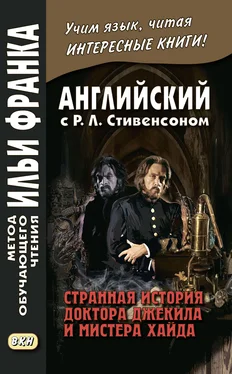blind[blaɪnd] , forehead['fɔrɪd; 'fɔ:hed] , discoloured[dɪs'kʌlǝd] , negligence['neɡlɪdʒ(ǝ)ns]
Two doors from one corner, on the left hand going east, the line was broken by the entry of a court; and just at that point, a certain sinister block of building thrust forward its gable on the street. It was two storeys high; showed no window, nothing but a door on the lower storey and a blind forehead of discoloured wall on the upper; and bore in every feature the marks of prolonged and sordid negligence.
The door, which was equipped with neither bell nor knocker(дверь, которая не была снабжена ни звонком, ни /дверным/ молотком; to equip – оборудовать, оснащать; to knock – стучать; knocker – дверной молоток, дверное кольцо ) , was blistered and distained(была облуплена и покрыта грязными разводами; to blister – покрываться пузырями/волдырями; blister – волдырь, водяной пузырь; stain – пятно ) . Tramps slouched into the recess and struck matches on the panels(бродяги забредали отдохнуть в ее нише и зажигали спички о ее панели; to slouch – сутулиться, горбиться; неуклюже держаться; to slouch about/around – слоняться, болтаться без дела; recess – углубление /в стене/, ниша; to strike – ударять; высекать /огонь/, зажигать ) ; children kept shop upon the steps(дети играли в магазин на ступенях; to keep a shop – держать лавку, магазин ) ; the schoolboy had tried his knife on the mouldings(школьник испробовал свой нож на ее резных завитушках; moulding – отлитое или формованное изделие; лепное украшение; to mould – формовать, лепить; отливать форму ) ; and for close on a generation, no one had appeared(и вот почти что лет тридцать никто не появлялся; generation – поколение; поколение, период времени ок. 30 лет ) to drive away these random visitors or to repair their ravages(чтобы прогнать этих случайных гостей или убрать следы их разрушительных действий; to drive away – прогонять: «гнать прочь»; random – случайный; произвольный; выборочный; беспорядочный; to repair – ремонтировать, чинить; ravage – опустошение, уничтожение; ravages – разрушительное действие ).
equip[ɪ'kwɪp] , slouch[slautʃ] , repair[rɪ'pɛǝ] , ravage['rævɪdʒ]
The door, which was equipped with neither bell nor knocker, was blistered and distained. Tramps slouched into the recess and struck matches on the panels; children kept shop upon the steps; the schoolboy had tried his knife on the mouldings; and for close on a generation, no one had appeared to drive away these random visitors or to repair their ravages.
Mr. Enfield and the lawyer were on the other side of the by-street(мистер Энфилд и адвокат шли по другой стороне улочки) ; but when they came abreast of the entry(но когда они поравнялись с этим входом; abreast – в ряд, на одной линии; breast – грудь ) , the former lifted up his cane and pointed(первый = мистер Энфилд поднял трость и указал /на него/).
“Did you ever remark that door(вы когда-нибудь обращали внимание на эту дверь; to remark – замечать, подмечать ) ?” he asked; and when his companion had replied in the affirmative(и когда его спутник ответил утвердительно; companion – товарищ; спутник, попутчик ) , “It is connected in my mind(для меня она связана; mind – ум, разум ) ,” added he(добавил он) , “with a very odd story(с одной очень странной историей) .”
“Indeed(неужели; indeed – в самом деле, действительно ) !” said Mr. Utterson, with a slight change of voice(произнес мистер Аттерсон слегка изменившимся голосом: «с легкой переменой голоса») , “and what was that(какой же: «и что это было») ?”
abreast[ǝ'brest] , affirmative[ǝ'fǝ:mǝtɪv] , slight[slaɪt]
Mr. Enfield and the lawyer were on the other side of the by-street; but when they came abreast of the entry, the former lifted up his cane and pointed.
“Did you ever remark that door?” he asked; and when his companion had replied in the affirmative, “It is connected in my mind,” added he, “with a very odd story.”
“Indeed!” said Mr. Utterson, with a slight change of voice, “and what was that?”
“Well, it was this way(итак/ну, дело было так) ,” returned Mr. Enfield(ответил мистер Энфилд; to return – возвращаться, идти обратно; отвечать, возражать ) : “I was coming home from some place at the end of the world(я возвращался домой откуда-то с края света: «из какого-то места на /другом/ конце света») , about three o'clock of a black winter morning(где-то часа в три темного зимнего утра) , and my way lay through a part of town(и путь мой лежал через ту часть города; to lie – лежать ) where there was literally nothing to be seen but lamps(где буквально ничего не было видно, кроме фонарей) . Street after street, and all the folks asleep – street after street(улица за улицей, и все люди /при этом/ спят, улица за улицей; folks – люди; folk – /уст./ народ; asleep – спящий ) , all lighted up as if for a procession, and all as empty as a church(все освещенные, словно для какого-то шествия = торжества , и опустелые, как церковь) – till at last I got into that state of mind when a man listens and listens(пока, в конце концов, я не впал в такое душевное состояние, когда все прислушиваешься да прислушиваешься) and begins to long for the sight of a policeman(и начинаешь страстно желать увидеть полицейского; to long for smth., smb. – очень хотеть, страстно желать чего-либо, кого-либо, испытывать потребность в чем-либо, в ком-либо; sight – зрение; вид ).
Читать дальше











